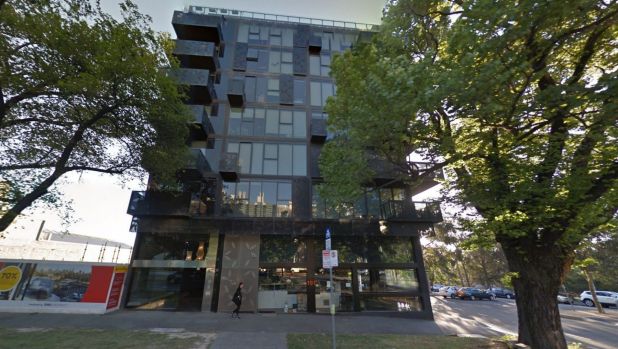
George apartments, North Melbourne Photo: Google Maps
- – The Age Newspaper National
- Source: http://www.theage.com.au/national/investigations/warm-water-systems-in-apartment-buildings-a-legionella-risk
- December 4, 2016
Leading plumbers fear many of Melbourne’s new apartment buildings pose a legionella bacteria risk due to their energy-efficient “warm water” systems.
The plumbers’ concerns come as documents show Victoria’s building regulator took nine months to exercise its power to demand a solution for the legionella risk in the warm-water system of North Melbourne’s George apartments.
The systems store water at lower temperatures than traditional units and have become popular in recent years as developers seek to achieve six-star energy efficiency ratings. They rely on solar-powered boosters to heat water on the way to residents’ shower heads.
But the cooler temperature for storage of between 25 to 40 degrees can encourage the growth of legionella bacteria, while solar energy does not always achieve high enough temperatures to kill it off.
The bacteria can be deadly once it becomes airborne in water droplets and is inhaled. Queensland and South Australia have reported legionella deaths from faulty warm-water systems in recent years.
Despite the increasing popularity of warm-water units in apartment buildings, state and Commonwealth regulators have yet to produce a prescribed standard for their assembly or installation.
Leaked emails and documents show a senior officer from the federal government’s Australian Building Codes Board (ABCB) recently expressed his concern about the “high-risk nature of warm-water systems”.
A 2015 ABCB report also noted “there are no prescriptive solutions under the Plumbing Code of Australia for the design, installation and management of warm water systems”.
Veteran Melbourne plumber and gas fitter Ian Pewtress has been engaged as an adviser by the George building’s owners’ corporation, and has been dealing with the Victorian Building Authority (VBA) over the apartments’ legionella issue for more than a year.
The North Melbourne building was constructed in 2011 for developer Evolve Developments, which is part owned by prominent Melbourne businessman Ron Walker.
Mr Pewtress said there were dozens of other buildings in the city facing the same legionella risk.
“We’ve identified 36 we know of throughout the CBD. There’s another one in Thornbury and another near Melbourne University,” said Mr Pewtress, whose company Pipetek is often called upon to clean slime from water boilers in apartments.
Kevin Shinners, a vice president of the Australian Master Plumbers Association, said the lack of regulation over warm-water systems meant many of them were being prepared for assembly by unlicensed people prior to their installation in buildings, compounding the risk of legionella.
Both plumbers are critical of the VBA’s response to the issue at George, which has about 150 residents, and fear the regulator has not grasped the scale of the potential legionella problem in apartment buildings across the state.
“There is a health and safety issue there but we don’t seem to get any traction with the VBA,” Mr Shinners said, adding that he was speaking in a private capacity and not on behalf of his association.
The VBA received a formal complaint about George’s system in September last year. But it was not until November that the VBA ordered the building’s storage tanks be bypassed, switching the water supply to mains, to negate any legionella risk.
On May 30 this year, the VBA used its regulatory powers to issue a rectification notice to the plumbing company that installed the warm-water system.
The notice said the system failed to meet “legionella bacteria control requirements,” and that the building’s solar hot-water tanks did not have the mandatory “Watermark” certification.
Mr Pewtress said a big part of the problem with warm-water systems in Melbourne was their reliance on solar-powered boosters to help kill any bacteria. He said Melbourne’s lack of sunshine over winter led to the water not being heated properly.
The VBA said in a statement that it acted quickly to protect residents at George from any risk and that ongoing monitoring of the water system was a maintenance issue for owners and their body corporate.
However, the regulator acknowledged more work needed to be done to develop an industry standard for the “design, installation and maintenance of multi-unit hot-water systems”.
A spokeswoman for Evolve Developments said the builder of the George was required to ensure a hot-water system was installed in line with state regulations.
She said that after 12 months of occupancy, the responsibility for maintenance of the water system rested with the owners’ corporation, which she claims was told that the system’s filters would need to be cleaned every fortnight to ensure it worked properly and posed no risk of legionella.
Mr Pewtress said residents at George – which won a national environmental award in 2012 – were still experiencing major problems with their water system more than a year after the VBA was first notified.
